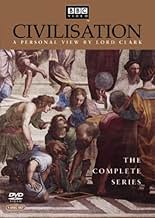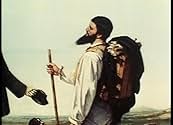CALIFICACIÓN DE IMDb
8.7/10
1.2 k
TU CALIFICACIÓN
Sir Kenneth Clark nos guía a través de las épocas explorando el glorioso ascenso de la civilización en el hombre occidental.Sir Kenneth Clark nos guía a través de las épocas explorando el glorioso ascenso de la civilización en el hombre occidental.Sir Kenneth Clark nos guía a través de las épocas explorando el glorioso ascenso de la civilización en el hombre occidental.
- Ganó 2premios BAFTA
- 4 premios ganados y 2 nominaciones en total
Explorar episodios
Opiniones destacadas
Clark becomes tiresome by modern standards. His focus is almost entirely on art and architecture omitting elements of science that could be legitimately included.
10stever-6
I was a young man in my impressionable early-20s, when Kenneth Clark's "Civilisation" made its appearance on American television. I recall, at the time, thinking what ambition to entitle a program so. Public Broadcasting had not been around for many years, and I expected a stodgy, pompous, supercilious approach to the subject of art and civilization, especially as it was coming from Britain. Surely, this was a program for the elite, the snobs of the art world, the aristocrats of Europe who had access to such treasures. Kenneth Clark truly changed those first impressions, presenting in a gentle, understandable way some of the great treasures of the human species. These pieces were no longer remote, mysterious objects stuffed away in some dusty museum or moldering palace. He clearly taught about each of his choices, seeming to enjoy the opportunity to pass on to the viewer his love and admiration for these works and their meaning, as they related to the modern world and to the world long past in which they were created. He was humorous and wise, and the photography was stunning. I immediately changed my major in college to art history and, although I never became wealthy from the education, I have always appreciated what I did learn, beginning with the inspiration provided by Kenneth Clark and "Civilisation." Mr. Clark became one of those people with whom I wish I could have spent an afternoon, just listening. I haven't seen the program in many years, though it was re-run often after its first showing. I would like to see this back on television, or on DVD. I do believe it was the inspiration for many similar, and more famous programs to follow and was part of that exceptional time in television when the UK sent us its best - "Civilisation", "The First Churchills", "The Six Wives of Henry VIII", "Elizabeth R", and "I, Claudius."
If "Civilisation" ever reappears, do yourself a favor. Sit back in an easy chair, tone down the distractions, have a good hot coffee, and enjoy the story of your past. It's shared by all of us, and Kenneth Clark will introduce you to yourself.
If "Civilisation" ever reappears, do yourself a favor. Sit back in an easy chair, tone down the distractions, have a good hot coffee, and enjoy the story of your past. It's shared by all of us, and Kenneth Clark will introduce you to yourself.
10gring0
Watching the series in China, it makes me all the more proud of my heritage. The last comment is a good one; let Clark introduce himself to you, just as one reads a Herodotus or Suetonius- to be in the presence of a knowledgeable and engaging friend. having visited many of the places shown, it's also a marked benefit that the series was filmed in 1969, when travel was truly the domain of those seeking enlightenment before our days of package tours. And how clear and lucid are his discussions of culture and history! Often I found myself anticipating his next sentence from my own classes I teach, but am left feeling pedantic and plebeian by comparison. Although the BBC continues to be a source of wonderment through its historical live-action recreation series such as Auschwitz, Pompeii and the Attenboroughs, this is truly of its time when there was no need for gimmicks or embellishment. www.tracesofevil.blogspot.com
First broadcast in 1969,Civilization was produced not only to showcase the new medium of color television but also to reassure a then turbulent society of its established roots.
Before viewing Civilization I had never heard of Kenneth Clark, or K Clark as he was known to his contemporaries. At first glance he appears to be the product of a stodgy old order, a stereotypical brown flannel suit poised very uneasily in the Age of Aquarius. However his soft demeanor, articulate observations and frank but reasonable opinions quickly become very endearing qualities. I soon found myself very disappointed I had never met the man, or at least lived through his era.
I can say with confidence that if you seriously enjoy history, particularly the European variety, you will enjoy Civilization. Even if you don't, the stunning and intimate portrayal of 1500 years of art may still be captivating enough to hold your attention. This program is unlike anything broadcast in the post-MTV era, and it sets a standard of culture and erudition that puts networks which should know better, like the History Channel, to shame.
Before viewing Civilization I had never heard of Kenneth Clark, or K Clark as he was known to his contemporaries. At first glance he appears to be the product of a stodgy old order, a stereotypical brown flannel suit poised very uneasily in the Age of Aquarius. However his soft demeanor, articulate observations and frank but reasonable opinions quickly become very endearing qualities. I soon found myself very disappointed I had never met the man, or at least lived through his era.
I can say with confidence that if you seriously enjoy history, particularly the European variety, you will enjoy Civilization. Even if you don't, the stunning and intimate portrayal of 1500 years of art may still be captivating enough to hold your attention. This program is unlike anything broadcast in the post-MTV era, and it sets a standard of culture and erudition that puts networks which should know better, like the History Channel, to shame.
There have been many fine video lecture series by prominent cultural figures, from Joseph Campbell to Robert Hughes, but for me, the finest is still the first, Kenneth Clark's landmark, "Civilization, A Personal View". The sub-title is important, for Clark's survey of western civilization through its art and architecture is certainly opinionated. And this gives the series a wonderful intimacy that previous televised surveys never approached.
Not only is there a wealth of information and insight in this beautiful production, but there is Kenneth Clark himself. A scholar of culture and art, admirer of Ruskin and student of Bernard Berenson, he was director of the Ashmolean Museum in Oxford and the National Galley in London, as well as pioneering arts commentator for radio and television in the UK. Kenneth, Lord Clark, raised to the peerage for his achievements, is perhaps the greatest impresario of art of the 20th century.
"Civilization, a Personal View" has been criticized by some art critics as being a bit "facile". I disagree. Clark's argumentation is always reasoned, never arbitrary. It certainly is facile for pop commentators to repeat the old tourist-pleasing but phony assertion that Michelangelo designed and built St. Peter's dome. It is Clark who points out that St. Peter's dome is the work of Giacomo della Porta, not Michelangelo. Is it facile for Clark to confess that when he was young he scorned Frans Hals out of snobbery, but later, "as I grew older," began to appreciate Hals's "convivial" figures? Facile indeed. Everything Clark says carries weight.
Aside from questions about Clark's personal views - he ends Civilization at the beginning of the modern era, not because he ran out of film but because he didn't care for modernism - it cannot be denied that he delivers them in such a lucid, congenial and engaging manner, that only the pedantic and churlish could fail to be delighted with a dapper, eloquent, beautifully spoken gentleman's tour through western history. Where else do pronunciations like caPITalism and usages such as "lie of the land" sound so wonderful than from the lips of this erudite Scotsman?
"And please allow me two minute's digression on the subject of tulips." I love it!
Clark's series is by far the best televised course in Western Civilization ever created. I doubt if it will ever be surpassed. There are two men I dearly miss having met before they died - Joseph Campbell and Kenneth Clark. Upon meeting Clark in "Civilization, a Personal View," I think you'll understand why.
Not only is there a wealth of information and insight in this beautiful production, but there is Kenneth Clark himself. A scholar of culture and art, admirer of Ruskin and student of Bernard Berenson, he was director of the Ashmolean Museum in Oxford and the National Galley in London, as well as pioneering arts commentator for radio and television in the UK. Kenneth, Lord Clark, raised to the peerage for his achievements, is perhaps the greatest impresario of art of the 20th century.
"Civilization, a Personal View" has been criticized by some art critics as being a bit "facile". I disagree. Clark's argumentation is always reasoned, never arbitrary. It certainly is facile for pop commentators to repeat the old tourist-pleasing but phony assertion that Michelangelo designed and built St. Peter's dome. It is Clark who points out that St. Peter's dome is the work of Giacomo della Porta, not Michelangelo. Is it facile for Clark to confess that when he was young he scorned Frans Hals out of snobbery, but later, "as I grew older," began to appreciate Hals's "convivial" figures? Facile indeed. Everything Clark says carries weight.
Aside from questions about Clark's personal views - he ends Civilization at the beginning of the modern era, not because he ran out of film but because he didn't care for modernism - it cannot be denied that he delivers them in such a lucid, congenial and engaging manner, that only the pedantic and churlish could fail to be delighted with a dapper, eloquent, beautifully spoken gentleman's tour through western history. Where else do pronunciations like caPITalism and usages such as "lie of the land" sound so wonderful than from the lips of this erudite Scotsman?
"And please allow me two minute's digression on the subject of tulips." I love it!
Clark's series is by far the best televised course in Western Civilization ever created. I doubt if it will ever be surpassed. There are two men I dearly miss having met before they died - Joseph Campbell and Kenneth Clark. Upon meeting Clark in "Civilization, a Personal View," I think you'll understand why.
¿Sabías que…?
- ErroresIn the segment titled "The Light of Experience", narrator Lord Clark discusses the great developments in Europe of the XVIIth century - mathematics, measurement, observation - and notes that these "were not hostile to architecture; nor to music, for this was the age of one of the greatest English composers, William Purcell." Here he is misquoting himself, for in the book that accompanies this series (Civilisation. New York and Evanston: Harper & Row, 1969, p.218) he correctly names the composer as Henry Purcell.
- ConexionesEdited from Mozart's Don Giovanni (1955)
Selecciones populares
Inicia sesión para calificar y agrega a la lista de videos para obtener recomendaciones personalizadas
- How many seasons does Civilisation have?Con tecnología de Alexa
Detalles
Contribuir a esta página
Sugiere una edición o agrega el contenido que falta

























